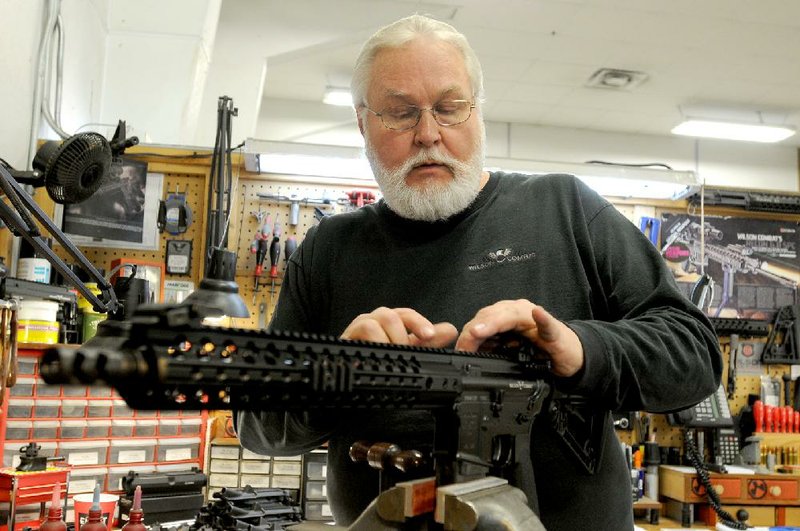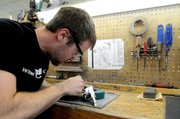Wilson Combat, an Arkansas-based maker of custom firearms, is joining other small manufacturers across the county in adopting no sale policies to law-enforcement agencies in states that adopt strict laws on gun ownership.
At least one other Arkansas firearm-maker is part of the no-sale movement while others are neutral or say direct political pressure is the best way to stop laws they believe restrict citizens’ Second Amendment rights.
“Wilson Combat will in noway support the government of these states or their anti-gun agenda that only limits the rights of law-abiding citizens,” Ryan Wilson, the company’s vice president, said in a release. The company said it will continue to supply products or services that are legally allowed to nongovernment-affiliated citizens in the no-sale states.
Wilson Combat has a national reputation as a maker of high-end guns, offering custom model 1911 pistols, AR-15-style rifles, tactical shotguns, magazines and other shooting gear. The privately held company, formed in 1977, is headquartered in Berryville in Carroll County and employs 90 people.
More than 110 specialty manufacturers have opted to stop selling firearms and other gear to law enforcement in states and cities with strict firearms-control laws. Known as the Firearms Equality Movement, the goal is to limit law enforcement to the same armaments available legally to the average citizen they police.
Large-scale law-enforcement suppliers including Glock, Ruger, Smith & Wesson, and Sig Sauer have not joined the movement. None of the companies answered requests for comment.
The no-sale campaign comes as the nation debates whether to ban military-style semiautomatic rifles, as well as laws that reduce the capacity of magazines.
Some U.S. firearm- and magazine-makers say they will relocate if their home states adopt stricter gun laws. Meanwhile, industry experts say sales of firearms and ammunition are at record highs, resulting in shortages.
The no-sale push began in early February to counter legislation signed by New York Gov. Andrew Cuomo that tightens the definition of semiautomatic, military style weapons that the state considers unlawful to possess and that limits magazine capacity to seven rounds.
Lists of companies participating in the no-sale movement can be found on ammoland.com, thepoliceloophole.com. and ncgunblog.com.
‘TROUBLING’ TO POLICE
John Grebert, executive director of the New York State Association of Chiefs of Police Inc., said that if the no-sale movement continues to spread, it could become a safety issue for officers.
“It’s troubling to us,” he said.
Police need the best tools to protect the public and themselves, Grebert said, adding that officers use a wide variety of gear in addition to firearms that could fall under the no-sale policy. He said more than 70,000 police officers work in New York state and the city of New York.
“Individual police officers have nothing to do with this new legislation,” Grebert said. “They’re not the ones anyone should be blaming.”
He said the association has been in contact with major law-enforcement suppliers and has been assured it will be business as usual. He declined to name those suppliers.
Wilson Combat began its no-sale policy in late February, and it covers law enforcement and state agencies in California, Hawaii, Maryland, Massachusetts, New Jersey, New York, Washington, D.C., and Chicago. The policy also applies to officers and state employees buying as individuals.
In response to an e-mail request, company President and Chief Executive Bill Wilson said he didn’t have time to for an interview because gun bans and restrictions are fueling the most dramatic buying frenzy the firearms industry has ever seen.
Wilson declined to say how much business his company did in the no-sale states but in an e-mail said the movement is a way to influence law enforcement, which has substantial political clout. “When major law enforcement agencies and organizations start to publicly stand up for the Second Amendment, then I’m sure the gun industry will begin to reconsider our position,” he wrote.
Michael Bane, author and television producer under contract with The Outdoor Channel, is a longtime friend of Wilson’s.
Bane said Wilson Combat products are the gold standard and Bill Wilson, a “rock solid” supporter of the Second Amendment, brings credibility to the movement.
“Bill has always stood up,” he said. “It’s an important time to stand up.”
Bane predicted the no-sale movement will grow among small gun-makers. He said larger, publicly traded manufacturers likely can’t join because of Security and Exchange Commission regulations.
STRONG LOBBYING
Not all gun-makers in Arkansas have adopted the no sale policy.
Craig Gholson, president and chief executive officer of Nighthawk Custom, also based in Berryville, said his company is fighting restrictive gun laws by donating money to the Institute for Legislative Action, the lobbying arm of The National Rifle Association.
“You’re not going to scare politicians like that,” he said about the no-sale movement. Instead, he said, a strong lobbying effort is the best way to protect Second Amendment freedoms.
Privately held Nighthawk Custom opened 10 years ago and employs nearly 50 workers. The company makes custom 1911 pistols and combat shotguns. Less than 5 percent of Nighthawk sales goes to law enforcement.
Demand for Nighthawk products has been incredible in recent months, Gholson said. The company is backordered two years on pistols and shotguns.
Max Rodriguez, senior vice president at Van Buren based Knesek Group, said the company’s sister organization, THOR Global Defense Group, builds and sells AR-15-style rifles and small arms. He said that while the company does some business with U.S. law enforcement, THOR primarily sells its weapons tooverseas law enforcement and military.
In an e-mail, Rodriguez said THOR had not imposed any restrictions on sales to state or government agencies. He said while he understands the reason behind the movement, those using the equipment should not be punished for the shortcomings of their state’s legislation.
GUN SALES RISE
A firearms industry trade group, the National Shooting Sports Foundation, told The Washington Times that companies are free to decide which customers or markets they wish to serve. However, it noted that agreeing with others to not sell to certain customers or markets could raise antitrust concerns and may be illegal.
Michael Bazinet, the foundation’s public-affairs director, said firearm-makers are seeing increased demand.
According to the foundation’s review of background check data supplied by the National Instant Criminal Background Check system that are commonly considered precursors to firearms sales, there were 1.79 million checks nationwide in January, an increase of 94 percent compared with the same period last year.
The foundation said projected sales figures for long guns, handguns and ammunition combined for the first through third quarter of 2012 will total $4.4 billion compared with $4.3 billion for all of 2011.
Chris Hettman, owner of NFA Gear LLC in Beebe, said he supports the Firearms Equality Movement.
NFA Gear has been in business for three years and is a small operation - just Hettman and his wife. The company makes suppressors and builds semiautomatic and selective-fire rifles, short-barreled shotguns and rifles as well as pistols.
In recent months, he has been snowed under by demand for firearms. Hettman said it’s been hard to get parts for his custom work.
“I have never seen anything like this,” he said.
He said NFA Gear’s sales in Arkansas, Arizona and a good deal of Texas are mostly unrestricted as long as the buyer can legally purchase the products. In other states, he limits the company’s sales to law-enforcement sales to match what citizens can purchase.
Most of his sales come by word-of-mouth, and law enforcement makes up less than 10 percent of his business. Still, he thinks it’s important to limit what he sells.
“It’s what’s legal and that’s what I need to sell,” Hettman said. “It’s just what Joe Blow on the street has.”
Front Section, Pages 1 on 03/09/2013



